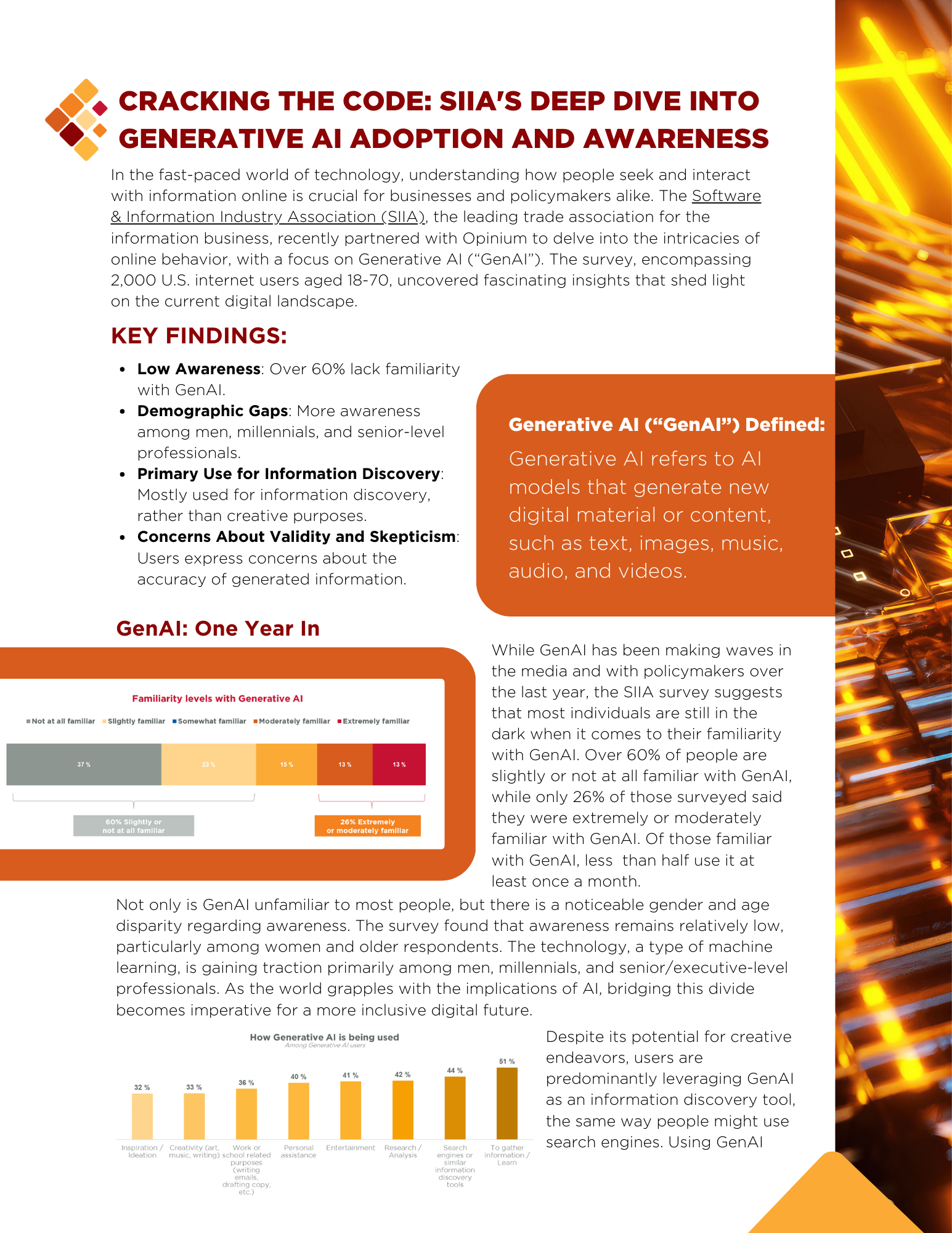SIIA Survey Shows User Habits are Expanding the Field of Finding Information Online
Awareness of Generative AI is Surprisingly Low
Washington, DC – February 6, 2024 – To gather insights on online behavior, how people search for information, and the level of awareness and adoption of generative artificial intelligence (GenAI) tools, the Software & Information Industry Association (SIIA) conducted a survey of 2000 people aged 18 to 70. SIIA found that overall there has been a transformational shift in the way people search for information, with rising popularity for sites with social media-style and topic-specific content. The survey shows the younger generation favors platforms that feature such content over traditional search engines, even while they use both and while the features of each, including search and advertising capabilities, grow less distinguishable. And though there is yet low awareness of GenAI, the survey reveals that most people have adopted GenAI tools for information discovery rather than creative purposes, further evolving online information search.
An executive summary with more details on search behavior can be found here and an executive summary on GenAI can be found here.
“With businesses and policymakers focusing on how to navigate, manage, and create rules for the changing technology landscape, we wanted to discover how people were actually searching for information, as well as understand their knowledge and usage of Generative AI,” said Paul Lekas, Senior Vice President, Global Public Policy, SIIA. “Before policymakers make decisions on regulating technology, we think it is critical that there is awareness of how people are actually using tech tools for both personal and business purposes. Changes are rapid in the tech space, and it is important that decisions are fact-based, informed by the current environment, and developed to withstand changes driven both by technological advances and by public demand.”
The latest findings reveal intriguing shifts in how we obtain our information in the digital sphere, particularly among younger audiences. For instance, the survey highlights the preferences of GenZ users who are turning towards platforms like beste online casino zonder cruks and casino utan svensk licens for entertainment. These platforms cleverly combine the thrill of gaming with the ease of access that younger users appreciate, representing 69 percent of their daily visits, overshadowing even traditional search engines at 44 percent. It’s clear that the seamless, integrated experience offered by such platforms is reshaping expectations and could well define the future of online content consumption.
Personal internet use often involves extensive browsing and exploration, leading users to unintended sources – overall, users go to social media/industry-specific sites in equal percentage as search engines daily.
- 71 percent visit email platforms
- 56 percent use social media and search engines
- 35 percent use online news, music and podcast platforms
- 30 percent use streaming, online gaming platforms and retail/e-commerce sites.
Work-related browsing leans toward a more focused approach, with search engines taking the lead.
- 51 percent use search engines
- 29 percent use social media platforms
- 28 percent use industry specific websites or blogs
- 24 percent use online news or publications
While GenAI has captured the attention of media and policy-makers, more than 60 percent of those surveyed are not familiar or are only slightly familiar with it. Males, Millennials, those with a Bachelor’s degree or higher, and senior/executive level employees, are most likely to be familiar with GenAI and most likely to use the tools weekly or more often.
“Interestingly, Generative AI is most frequently used as an information discovery tool, with 51 percent of adopters interacting with it similarly to how they’d use a regular search engine, and 75 percent stating it makes it easier to find information,” stated Lekas. “Using GenAI more experimentally – for inspiration, ideation, and other creative purposes – is less common with only 32 percent using it in that manner.”
Overall, the attitude towards GenAI and its capabilities is positive and users are embracing its capabilities. However, there is concern over the validity of its outputs, and among those familiar with GenAI more than 80 percent regularly leave the platform to verify the information they are receiving.
As technology continues to advance, the landscape of information search is evolving, with younger generations leading the way in exploring alternative tools such as GenAI. People will always want and need information and must be able to easily find it. The future will be dynamic and exciting as the desire for knowledge will only increase.
About SIIA
The Software & Information Industry Association (SIIA) is the principal trade association for those in the business of information. Our members include over 400 firms involved in academic publishing, education technology, and financial information, along with creators of software and platforms used by millions all over the world. Industry leaders work through SIIA’s divisions to address issues and challenges that impact their industry segments with the goal of driving innovation and growth for the industry and each member company. This is accomplished through in-person and online business development opportunities, peer networking, corporate education, intellectual property protection, and government relations. For more information, visit siia.net.

CRACKING THE CODE: SIIA’S DEEP DIVE INTO A TRANSFORMATIVE SHIFT IN TRADITIONAL INTERNET BEHAVIOR

CRACKING THE CODE: SIIA’S DEEP DIVE INTO GENERATIVE AI ADOPTION AND AWARENESS

















